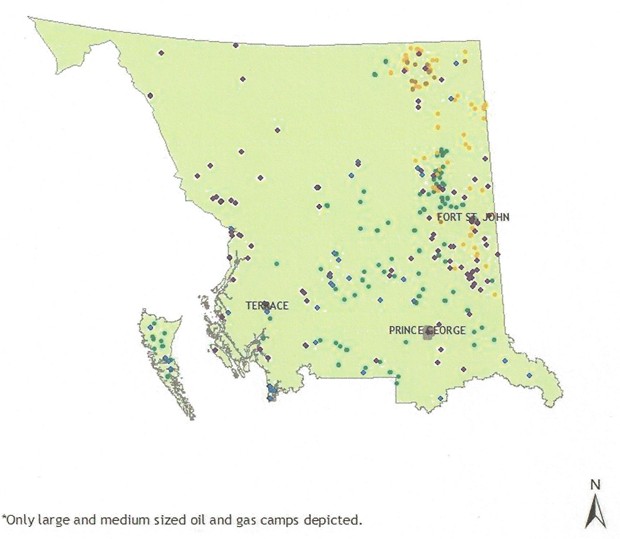Northern Health Tries to Prep For Challenges Posed By Work Camps
Wednesday, October 17, 2012 @ 5:53 PM

Northern Health’s survey of work camps in northern B.C. as of end of March 2012. Brown = Oil and gas camp over 5 ha; yellow/orange= oil and gas camps 1-5 ha;
green=forestrylogging camp; green diamond caps with water license ; purple diamond = Major projects which MAY include a camp
Prince George, B.C.- With billions of dollars in resource development projects on the radar for northern B.C and thousands of jobs to make those projects a reality, Northern Health is trying to come to terms with a major issue, industrial work camps.
At its regular meeting today, the Board for Northern Health examined a discussion paper on the issues and challenges posed by work camps. Whether they be small or large, there are health issues. From isolation, to alcohol and drug addiction, access to health services and a variety of other issues are all part of a study to prepare for the influx of workers and the growth of work camps.
According to a background paper presented today, there are 1,809 industrial camp sites identified through several different sources. The problem is, it isn’t known for certain how many are active “With the exception of logging camps, it is not known which camps are currently active, which ones may be scheduled for future development or which ones may be retired camp sites” reads the report.
The report also notes “These numbers do not include the smaller, more transient camps that are more difficult to track (exploration, silviculture). There are also 98 current or proposed major projects along with 11 operating mines and 27 proposed new ones which are or will likely be accompanied by more camps.” The proposals include preparation for work camps to house as many as 10 thousand workers in the Atlin area to serve the mining development in that region.
“We know there is a transient work force in the north,” said Dr. Ronald Chapman, Chief Medical Health Officer for Northern Health. “We don’t know the complexity of their health challenges, where they might access services, and what services we may need to provide in the north for that group; and that’s work we need to do.”
The background paper raises many questions that will require further research, including a better understanding of the impact of industrial camp activity on current health services.
“Industrial camps are a topic of discussion wherever we go and whenever we meet with municipal leaders and business,” said Dr. Charles Jago, Northern Health Board Chair. “This initial information stresses the importance NH places on the issue and our commitment to understand the scope of the challenge communities might be facing.”
Additional work is being undertaken and Northern Health is committed to working to fully understand the challenges that are faced by northern communities.

Comments
Some ETV’s (Emergency Transport Vehicles) located at some of these remote camps are in pretty sad shape. Some are actually used for storing tools, parts etc.. Not something you could rely on in an emergency.
Would Northern Health consider posting a qualified nurse or nurses at some of these remote camps?
Just thinking….
Good on Northern Health for getting on top of it….
What about making it mandatory for all camps to have medical staff on site? I know most camps have 1st aiders out there. I’ve seen some scary ETVs, too, though. Does anyone know if camps have access to emergency flights/helicopters?
Just thinking out loud. It’s good to see NH is thinking about the issue, but I’d like to find out proposed solutions they are working on/brainstorming.
What are the blue dots?
Glad to see proactive thinking going on at the N.H.A.
metalman.
Are there going to be foreign workers in these camp enviroments? IMHO the Harper mentality won’t work unlesshe is trying to produce a hell on earth senario.
Doesn’t this fall under Worksafe’s mandate?
There is a mandate in BC for each company to ensure they have they meet the minimum requirement for emergencies, it is not up to the NHA to provide medical to staff these camps.
That being said I think NHA is looking to prepare for emergency needs should there be a large overflow of emergent cases from these camps.
For example Mt Milligan is only required to have EMT’s on staff as they are within a certain distance from the nearest hospital. Emergent cases get driven or medivacd to Fort St James.
If they need an emergency helicopters they call 911. 911 contacts a local helicopter company and sends them out wih paramedics off an ambulance.
With all the remote areas in BC we should have designated emergency helicoptors like the STARS ones in Alberta.
Comments for this article are closed.